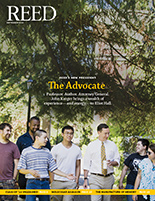
IRIS login | Reed College home Volume 91, No. 3: September 2012
Diversity and Racism
I was deeply disappointed, but not surprised, to read the arguments of Michael Schein ’76 and David Bloch ’93 against diversity hiring at Reed [Letters, June 2012]. These alumni claim to be “colorblind”—and insist that racism will only end when people and institutions become supposedly indifferent to race altogether. What they are truly blind to, however, is the disproportionate violence and discrimination that American people of color, along with women and queers, will continue to face at the hands of schools, the police, and their peers regardless of the priorities that Reed sets for faculty hires.
Michael Schein asserts that by setting diversity as a goal, “we create a rigged game” that treats white people unfairly. But he fails to realize that the game is already rigged. White people receive treatment in education, the workplace, and public space that is vastly superior to that experienced by people of color. Opposing the consideration of diversity in faculty hires is tantamount to closing one’s eyes and shouting loudly in the hope that racism will disappear if one just waits long enough. But if American history has taught us anything, it’s that racism is not going away.
The bubble is a lie. Reed students come from the rest of the world, and they return to it. They experience the effects of white supremacy and they perpetuate it. To ignore the disadvantages people of color face and to pretend that they don’t exist at Reed is to be complicit in that institutionalized, racist violence. Colorblindness may not be an overt racism, but it is certainly an insidious and real one.
My fellow alumni might prefer that Reed would sweep the ugly and awful truth of American racism under the rug. I, for one, expect better of my school.
Exactly when can we look forward to hearing the end of the “racism is no less poisonous when turned against a white person” lament? [Michael Schein ’76, Letters, June 2012] Dr. Martin Luther King Jr. did not say this, nor did he imply it when he said, “I have a dream that my children will one day live in a nation where they will not be judged by the color of their skin but by the content of their character.” His children were African American, and if you ask me, and if you ask a lot of African Americans, that time has hardly arrived for black people and other people of color. It’s just way too easy for advantaged white people to complain that they’re not getting a fair shake. Where is it spelled out that life is supposed to be fair for any person? Where is the evidence that it is so?
Mr. Schein states that “affirmative action was necessarily a temporary remedy, because it punishes new generations for the sins of those that came before.” Uh, huh. Germany is still making reparations for the unspeakable crimes against humanity that were committed many decades ago by Germany; is it “time to move on,” then? Not that this is a perfect analogy; but where is it written that we stop making reparations when it suits our purpose?
And who says, outrageously, that “today, racial minorities benefit”? How often, in what ways; precisely what does a privileged white family know about the experience of being black in America? Yes, Mr. Schein, a white family whose daughter attended “one of the finest urban graduate schools” is a privileged family; check this out with anyone trying to survive in your nearest housing project. When you write, “In the 21st century, the adversity we all face is not principally determined by race,” have you checked that one out with those “streetwise kids of all colors”? We didn’t need the example of Trayvon Martin to bring home this point, but . . .
And who ever claimed that affirmative action “is based on the assumption that students cannot learn as well from persons of other races?” No, no, no. Affirmative action is an ongoing effort, however besieged, to level a playing field that may never in fact be level: the goal of a fair game with equal opportunity for all people is nowhere in sight; it’s not even imaginable in our lifetime.
I could go on and on, but I’m afraid this is one of those visceral, unresolvable divides like the debate over abortion. Suffice it to say you should count your many blessings: your daughter sounds like a wonderful person, a high achiever, a striver, a person of widely recognized good character, rich in nurture and nature, possessed of a topnotch education. I hope she appreciates how sweet and lucky her life is.


LATEST COMMENTS
steve-jobs-1976 I knew Steve Jobs when he was on the second floor of Quincy. (Fall...
Utnapishtim - 2 weeks ago
Prof. Mason Drukman [political science 1964–70] This is gold, pure gold. God bless, Prof. Drukman.
puredog - 1 month ago
virginia-davis-1965 Such a good friend & compatriot in the day of Satyricon...
czarchasm - 4 months ago
John Peara Baba 1990 John died of a broken heart from losing his mom and then his...
kodachrome - 7 months ago
Carol Sawyer 1962 Who wrote this obit? I'm writing something about Carol Sawyer...
MsLaurie Pepper - 8 months ago
William W. Wissman MAT 1969 ...and THREE sisters. Sabra, the oldest, Mary, the middle, and...
riclf - 10 months ago